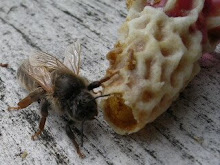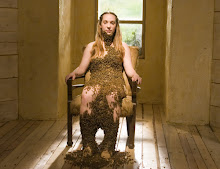Dave,
I've been puzzling about why it seems that feral hives that are
established, say in the side of a house, a tree trunk, etc. seem to
have a better survival rate than mine. In Carlton, out of four hives
I know of, one in a log was destroyed by a bear, one in a wall was
poisoned by the owner (to my dismay), and two were removed from
houses by beekeepers.
I can't think of a single wild hive that was lost due to winter kill.
Is that your observance also?
If so, I've been wondering why.
Perhaps the process of honey removal in the fall is a major factor.
Imagine coming home in October to discover your wood pile mostly
gone, your house ransacked and holes in all the walls to let the wind
blow through. Two weeks later it is winter.
If there is anything to this, perhaps fall is the wrong time to
remove honey.
Why couldn't it wait until the spring?
The only down side I can think of is possible crystallization over the
winter. It seems like when I take honey off of dead outs in the
spring, most of the remaining capped honey is OK, only uncapped is
crystallized. However, I say this from memory and am not really sure
how true that is.
Another management technique would be to take off early honey, say in
mid-August and then leave the hives heavy over the winter. Say four
boxes high.
In the spring, remove dead outs and strip whatever seems excess for
the survivors.
What do you think?
-Craig
P.S.: Iif you think there is anything to this, you might post it on the
blog. Perhaps we could do a study with the class.
Sunday, April 13, 2008
Subscribe to:
Post Comments (Atom)







1 comment:
When we moved here in 1972, some cottonwood trees had colonies in them. Guys who grew up here would cut down the tree in the winter and 'rob' the honey, leaving the bees to freeze on the snow. I never hear of bees in hollow trees or houses in this area any more, except for the colony which has lived for many years in the attic at Granny McLean's old house up the Chewuch.
Maybe someone would like to try harvesting honey in the spring or midsummer to test your idea, Craig.
Post a Comment